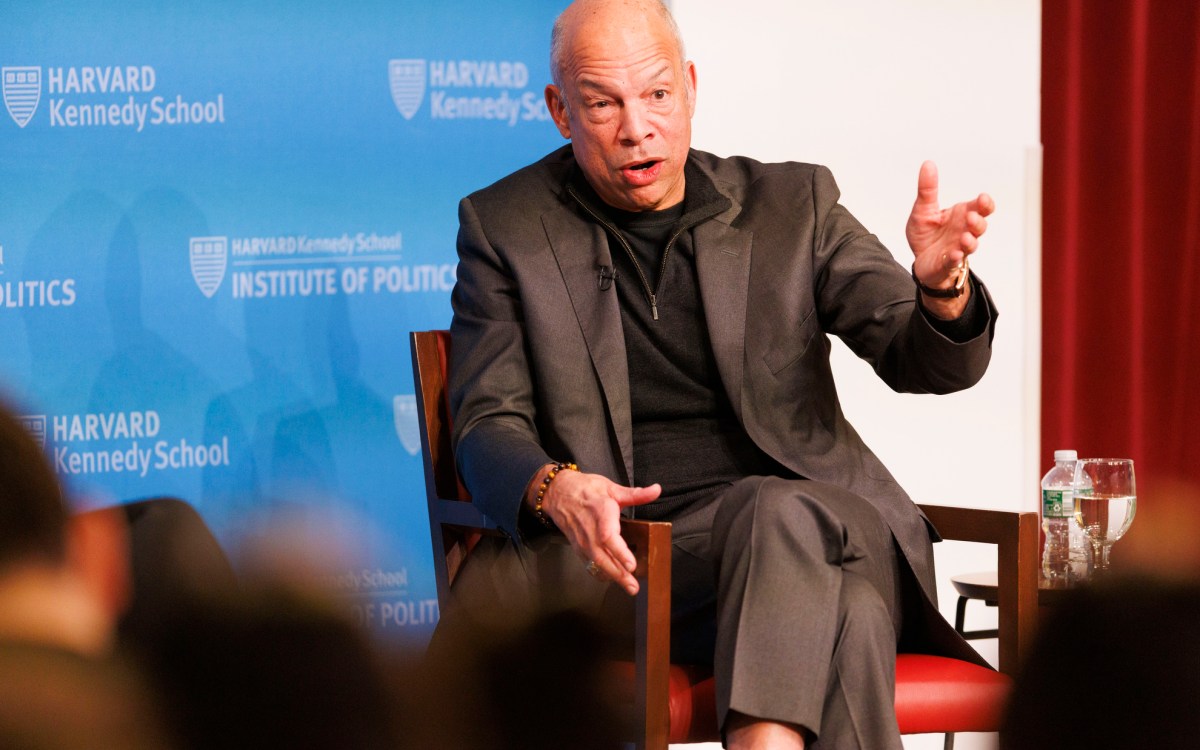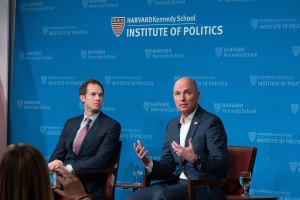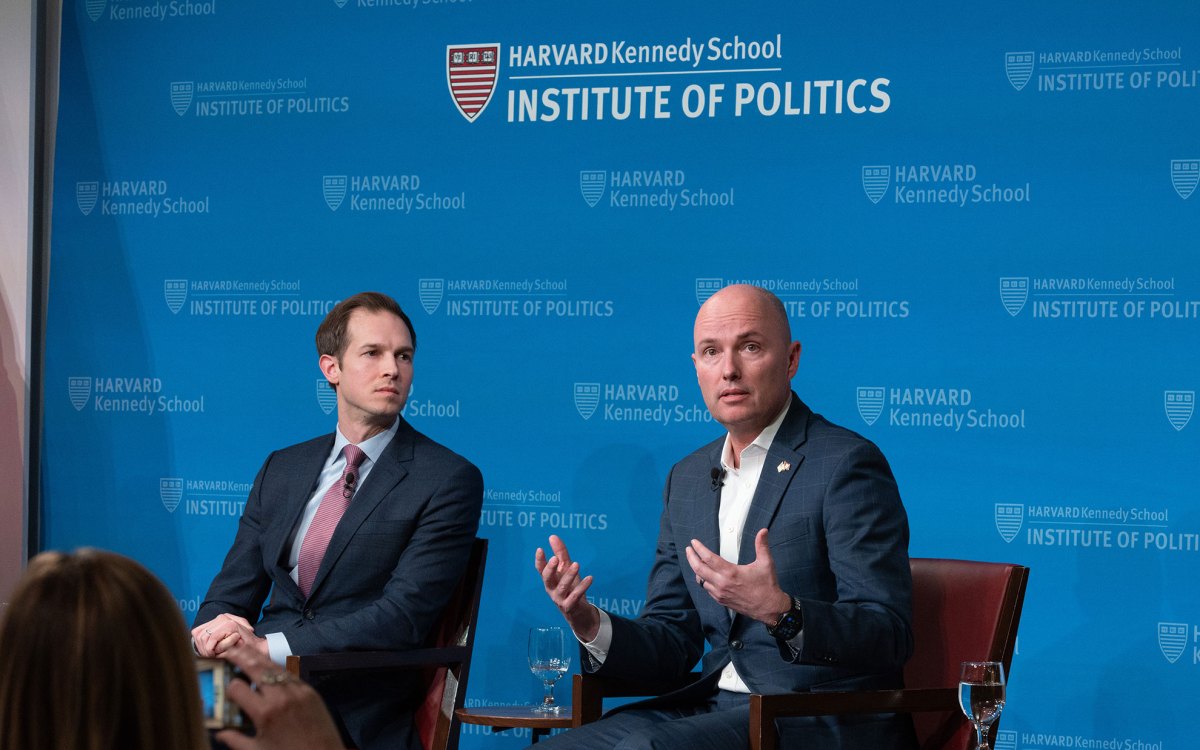Bob Schieffer sees information overload
Society needs better tools to track what’s true and what’s not, veteran correspondent says
In the digital era, Americans have instant access to more information about everything — from health, science, and global affairs to the leaders of local, state, and federal government — than ever before. But are we better off or even better informed?
In researching his new book “Overload: Finding the Truth in Today’s Deluge of News,” veteran CBS News journalist Bob Schieffer spoke to top news editors and reporters about the technological changes to newsgathering and publishing over the past 15-plus years that have made it harder for Americans to filter out fact from fiction and to process the information coming at them 24/7. The rise of social media as the primary purveyor of news, despite platforms like Facebook insisting they’re not news sources, has made the public vulnerable to propaganda, hoaxes, and other forms of misleading or inaccurate information.
Schieffer, a 2015–2016 fellow at the Shorenstein Center on Media, Politics and Public Policy at Harvard Kennedy School, recently returned to Harvard and spoke with the Gazette about the chaotic state of national politics and media coverage, and how Facebook, Twitter, and other social media — and ordinary news consumers — need to adapt to the new realities.
GAZETTE: We last spoke in the fall of 2015 during the presidential primaries. Back then you said you felt we were at “a real turning point in the country.” How do you feel now?
SCHIEFFER: At that point, I thought Donald Trump had a good chance at getting the nomination. I took him very seriously. I had interviewed Trump over a series of years, but I had never seen him on the stump until the South Carolina primary. We probably interviewed 35 people before he spoke. To a person, they said, “I just like the way he’s not afraid to speak his mind.” I came away thinking he’s saying what they wish they could say to their boss on their worst day of work. And that’s when I came to really start to believe he was going to win the Republican nomination.
Now, after some of the things he did where he violated every rule in the book, I never thought he would be elected president. And I could never find anyone in the Republican establishment who thought he was going to win either. I remember going up to Capitol Hill the week before the Republican convention. I couldn’t find a single person in the leadership who thought he was going to win. What they were trying to do at that point was figure out a way to shift the money that was coming into their Senate races because they were afraid he was going to lose and take down the Senate with him. Well, what do we know? He did win. He crafted a message that somehow cut through all the political chatter and got to those people, especially out in the rural areas of this country, who felt they were being left behind. Maybe they didn’t particularly like him, but they thought, “What could be worse? Nothing is happening now.” So they took a flyer. And in the end, that’s how he got elected. He found a way to speak to them, and Hillary Clinton never did. She was eminently qualified, I don’t take that away from her, but her campaign was never able to really establish a rationale for her candidacy.
GAZETTE: You’ve been in the news business since the Kennedy administration. How does this era compare?
SCHIEFFER: When people used to ask me, “What was your favorite beat” (because I’ve covered all the big beats in Washington), they’d say, “I guess it was the White House, right?” And I always say, “No! Not at all.” I enjoyed covering the White House, but at the White House everyone works for the same guy. You get up on Capitol Hill, and they’re all independent contractors, and that’s how you get news. Well, that’s not apt anymore. Because in this White House, there are as many factions right now as there are up on Capitol Hill, and they all have different agendas. Many of them just hate each other and make no secret about that. You can find all kinds of people to talk with in this White House. They talk more than any White House I’ve ever seen. They’re far from on the same page, and that’s what’s really different here.
GAZETTE: What do you make of Sen. Bob Corker’s (R-Tenn.) remarks where he said that President Trump’s erratic mental state and belligerent posturing could put the United States on a path to World War III if he’s not restrained by senior aides, and that most of the Republicans in the Senate share this view? And what do you think of the friction between the president and his secretary of state?
SCHIEFFER: We’ve never had anything like this. This was a campaign unlike anything we’d ever seen, and now this has become a presidency unlike anything we’ve ever seen. There’s the idea that the president would be undercutting his own secretary of state, who’s trying to negotiate some kind of opening where we could have discussions with North Korea. And to have the president tweet out “You’re wasting your time” — I can’t ever recall any president reacting in that way. And this is what, of course, Sen. Corker was reacting to. I have to say in all honesty I don’t know what’s going to happen. I think we’re in a very dangerous time. We probably just have to strap ourselves in here and hope for the best.
GAZETTE: Do you think these extraordinary comments might provide a tipping point in relations between the administration and a GOP-led Congress?
SCHIEFFER: I think it’s going to make everything harder for Trump. Think about this: It’s an open secret that the president doesn’t like his secretary of state. Trump has made that known in a variety of ways. Frankly, I don’t see how [Rex] Tillerson can last much beyond Christmas because he now has no power whatsoever. When word gets out that the president doesn’t like you, why does anyone want to talk to you? Regardless of his talents and his abilities, I think it’s impossible now for him to be effective. So let’s say he goes. Whoever Mr. Trump nominates to take his place is going to have to be confirmed by the Senate Foreign Relations Committee Chairman Bob Corker. I think Corker is a patriotic person and a person of good character, and I think he’ll do, in the end, what’s best for the country. But having him on your bad side is not going to make it easier for you on a variety of things. Trump is not expanding his influence on Capitol Hill. To the contrary, he seems to be narrowing it. What he is saying is very popular with his base, but I don’t see him broadening his power. The presidency is about persuasion, it’s not ordering people around. It’s persuading people that it’s in their best interest to do what you’re advocating.
GAZETTE: How much of what happened in the 2016 election should be blamed on the press, and what needs to change to correct those mistakes?
SCHIEFFER: On the whole, I think the press did a really good job. I think we fulfilled our mission. I found a lot of people who didn’t like Hillary Clinton and a lot of people who didn’t like Donald Trump, but I have yet to run into anybody who said they didn’t have enough information about both of them to cast their votes. So if that’s the case, I think we did our job.
What Trump was so good at is this old political theory called the “dead cat theory.” If you’re having a dinner party, I don’t care what you’re talking about, if someone throws a dead cat in the middle of the table, the conversation immediately shifts to the dead cat. And he did that over and over. The early morning tweets: He would say something before 7 o’clock in the morning, it’s on all the morning shows, and the rest of the day, the campaign narrative was about reacting to what he had said. Is it right? Is it wrong? And the Clinton folks just never figured that out until it was too late.
We’ve got to find some way to get our polling better. As news organizations, we’re going to have to go back to doing more focus groups to go along with what we’re finding out with analytics. Peter Hart, he’s the dean of the pollsters, said, “We can find out a lot with social media, but you can’t know what’s in people’s hearts.” And that’s the part that we never got to and really understood. This is why the decline of local newspapers is such a factor. In the old days, newspapers would send people out and they knew, “This is a Republican neighborhood,” and they’d go out and knock on the doors and ask, “Are you going to be for or against, and why?” And we don’t do that anymore. They can’t do it because they don’t have the manpower to do it. So, they’re leaning on these polls.
GAZETTE: With revelations that the Russians bought ads and pretended to be Americans in order to manipulate users of Google, Facebook, Twitter, YouTube, Instagram, and other platforms during the election, should these companies be regulated when they accept money from politics, like TV and other broadcast media are?
SCHIEFFER: Something is going to have to happen here. Facebook and Google started out saying, “We’re technology companies, we’re not media companies. We’re not responsible for what pops up; we can’t check out every message.” They’re going to have to do something. When you have 67 percent, I think, of the American people now getting at least some of their news off Facebook, to say that you’re not a media company? We’ve got to figure out a way, I don’t want to say to police this, because it’s a very difficult problem. How do you separate parity and political comment from just straight-out propaganda and messages that are like crying “Fire!” in a crowded theater? Now, the social media companies are at least saying, “We’re going to try to do something about this.” But they’ve got a lot to do here.
GAZETTE: In your new book, you argue there’s a fire hose of information — both real and fake — coming at us so rapidly, it’s become harder to process events and discern what’s true and what’s not. How so, and isn’t that “flood the zone” tactic a hallmark of propaganda campaigns?
SCHIEFFER: Sure. If you look across Europe and see what the Russians have done in all the satellite countries around them, they don’t drive their tanks across the border anymore. They found a cheaper, better way to do it. They go in, they use cyber to cause confusion, they bribe the local politicians, they make sweetheart deals with the local oligarchs, they loan them money, and then the next thing you know, they’re in control. That’s the Russian playbook. And we’re seeing the same thing in this country, and we simply have to recognize this. There’s no question that people have found a way to game this system. They figured out how you can manipulate this stuff to their own financial as well as national security advantages. And that’s the part we have to really be aware of and understand is happening. You can’t rebut every single lie, but we have to find a way to inoculate people and help them understand that just because you see it on the internet doesn’t make it true. Don’t just depend on one source for your news. Know where your news is coming from. I think that’s one of the things that those of us in the media have not done a good enough job at.
Social media is having a greater impact on our culture than the invention of the printing press did on people of that day. We all talk about the wonderful thing the printing press was, and it obviously was, but there were 30 years of religious wars before Europe finally settled back into some sort of equilibrium. We’re just in the first trimester of this thing. We don’t know where all of this is going, and it’s going to take us a while to work our way through it. But in the meantime, it’s going to be a bumpy ride.
This interview has been edited for clarity and length.




